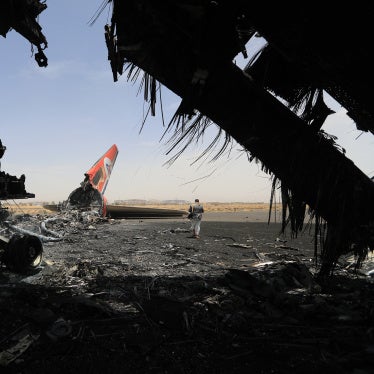In An Alliance Beyond the Law: Enforced Disappearances in Lebanon, released today, Human Rights Watch calls on the Lebanese government to take firm and transparent measures to end abuses in Lebanon at the hands of Syrian security forces, and to ensure that Lebanese military and security authorities in no manner participate in or facilitate "disappearances" on Lebanese soil.
The seizures of these individuals take place outside the law. As the Beirut Bar Association reported in April 1997: "No existing legislation or bilateral treaty allows such conduct." Moreover, victims do not benefit from the protection of the law. There are no effective official government mechanisms -- in Lebanon or in Syria -- for families to learn of the whereabouts of their relatives and to seek legal remedy. Human Rights Watch has also obtained first-hand testimony indicating that Syrian intelligence forces have detained some Lebanese and held them incommunicado -- in Syrian detention facilities in Lebanon, and in Syria -- in order to pressure them to collaborate with Syrian intelligence in Lebanon.
Some 30,000 Syrian troops remain in Lebanon, as well as an undisclosed number of intelligence officers and other operatives. Syrian intelligence forces are known to maintain detention facilities in at least five locations inside Lebanon: in Tripoli in the north; in west Beirut at the headquarters of Syrian intelligence on Sadat Street, near the Beau Rivage Hotel in the Ramlet al-Baida neighborhood, an area also known as Beau Rivage; in Chtoura in the Beqaa' valley; and in Anjar, east of the Beirut-Damascus highway, near the Lebanese-Syria border. There is also a detention facility in Hazmiyeh, on the outskirts of Beirut, where a joint Syrian-Lebanese intelligence force reportedly is based. This report includes information about and testimony from Lebanese and stateless Palestinians who have been detained at these facilities.
For Lebanese Muslims and Christians alike, the phenomenon of "disappearances" is one manifestation of what many of them view as de facto Syrian control -- or "annexation" or "occupation," as they variously describe it -- of their country. Indeed, public discussion of "disappearances" is largely taboo in Lebanon, and efforts to address the problem generally, or individual cases specifically, are not undertaken. Families of the "disappeared" typically are afraid to come forward with information for fear of worsening the situation for their loved ones or putting themselves at risk of harassment or reprisal. They have been unable to secure assistance from Lebanese government officials or Lebanese nongovernmental organizations to obtain information about, access to, or the release of their relatives.
Human Rights Watch wrote to Lebanese and Syrian government officials four times to express concern, to request information, and to recommend steps to remedy the problem of the continuing "disappearances." These letters -- to Lebanese Prime Minister Rafiq Hariri in October 1996 and March 1997, and to Syrian President Hafez al-Asad in November 1996 and March 1997 -- have gone unanswered, and persons continue to be detained and "disappeared" on Lebanese soil.
The Lebanese government clearly has ceded certain police powers to Syrian intelligence forces inside Lebanon -- in practice if not also by secret agreement. By providing an effective guarantee of impunity for human rights abuses under this arrangement, Lebanese authorities must bear a measure of direct responsibility for these abuses. Lebanese complicity in abuses by Syrian forces sometimes goes beyond official acquiescence and becomes direct collaboration with Syrian forces in carrying out reported "disappearances."
Among Human Rights Watch's recommedations are the following:
To the Government of Syria
The Syrian government should apply the principles of transparency and accountability to address the problem of foreign nationals and stateless Palestinians who are detained in Syria, and to bring some measure of justice to victims and their families. Human Rights Watch urges the Syrian government to take the following actions:
Make public the names of all non-Syrians -- including Lebanese citizens and stateless Palestinians -- who are currently detained or imprisoned in Syria.
Individuals who are unlawfully detained should be immediately and unconditionally released.
Syrian authorities should also investigate allegations that Lebanese citizens and stateless Palestinians have been tortured at Syrian detention facilities inside Lebanon, and should take steps to bring such practices to an immediate halt.
Establish effective procedures for prompt response to inquiries from families, lawyers and nongovernmental organizations about the whereabouts of individuals who have been detained.
To the Government of Lebanon
Initiatives by the Lebanese government are also required in order to hold Syrian security forces in Lebanon accountable for their actions. The following affirmative steps may help break the barrier of fear that has prevented families from coming forward when "disappearances" occur, and has likewise discouraged lawyers from providing legal representation and independent nongovernmental organizations from undertaking advocacy on behalf of the victims:
Take firm and fully transparent measures to ensure that abuses at the hands of Syrian security forces in Lebanon come to an end.
Prime Minister Rafiq Hariri and President Elias Hrawi should publicly declare that Syrian forces will not be permitted to operate with impunity on Lebanese soil, and should set forth the legal regime by which such forces are disciplined and held accountable for criminal offenses committed in Lebanon. Similarly, Lebanese government officials should convey to commanders of Lebanese military, intelligence and other security forces that their personnel must not participate in "disappearances" in any manner. The government should further make clear that commanders who order or condone "disappearances" will be held criminally responsible for these actions and prosecuted to the fullest extent of the law.
To ensure that Lebanese military and security authorities in no manner participate in or facilitate "disappearances," the government should require that at the time of arrest or detention on Lebanese soil the arresting authorities identify themselves, and that all individuals taken into custody in Lebanon be held in publicly recognized places of detention, where accurate registers of detainees and prisoners are maintained and available for public inspection.
Immediate steps should be taken to establish an independent legal office with full authority to investigate all cases of "disappearances" in a prompt and transparent manner. This office should be empowered not only to determine the whereabouts of the "disappeared," but also to secure prompt access to these individuals for lawyers and family members. The creation of this office should be widely publicized in Lebanon, and its services should be made available to all residents of the country, including stateless Palestinians who are permanent residents.
To the United Nations Working Group on Enforced or Involuntary Disappearances
The Working Group should investigate cases of enforced disappearance in Lebanon, and make demarches to Lebanese and Syrian authorities in order to determine the fate and whereabouts of the "disappeared."
Given the extraterritorial dimension of the practice of enforced disappearances in Lebanon, Human Rights Watch recommends that the Working Group analyze the issue in light of the Declaration on the Protection of All Persons from Enforced Disappearance, and publicize its conclusions in relation to the implementation of the Declaration when there is such a dimension.
To the European Union and Member States
Publicly acknowledge at a high level and condemn actions by Lebanese and Syrian authorities that result in the "disappearances" of Lebanese citizens and stateless Palestinians.
Raise with the Lebanese and Syrian governments at the highest levels, and as an urgent matter, the cases of Lebanese citizens and stateless Palestinians who have "disappeared" at the hands of state agents, and impress upon both governments the need to respond positively to the recommendations in this report.
Instruct embassy staff in Damascus to raise and pursue specific cases of "disappearances" with Syrian authorities and to seek access to detainees whose names are known.
Use all possible means, including linkage of aid and financial assistance to Syria, to obtain a full accounting by the Syrian government concerning persons detained and "disappeared" by agents of the Syrian state, and on a public commitment by the government of Syria to cease such practices immediately.
To the Clinton Administration
Publicly acknowledge at a high level and condemn actions by Lebanese and Syrian authorities that result in the "disappearances" of Lebanese citizens and stateless Palestinians.
Raise with the Lebanese and Syrian governments at the highest levels, and as an urgent matter, the cases of Lebanese citizens and stateless Palestinians who have "disappeared" at the hands of state agents, and impress upon both governments the need to respond positively to the recommendations in this report.
Instruct embassy staff in Damascus to raise and pursue specific cases of "disappearances" with Syrian authorities and to seek access to detainees whose names are known.
In the context of the multilateral "Friends of Lebanon" initiative, launched in 1996 to promote assistance to and investment in Lebanon, urge the government of Lebanon to implement the recommendations in this report, and publicly support such initiatives.








